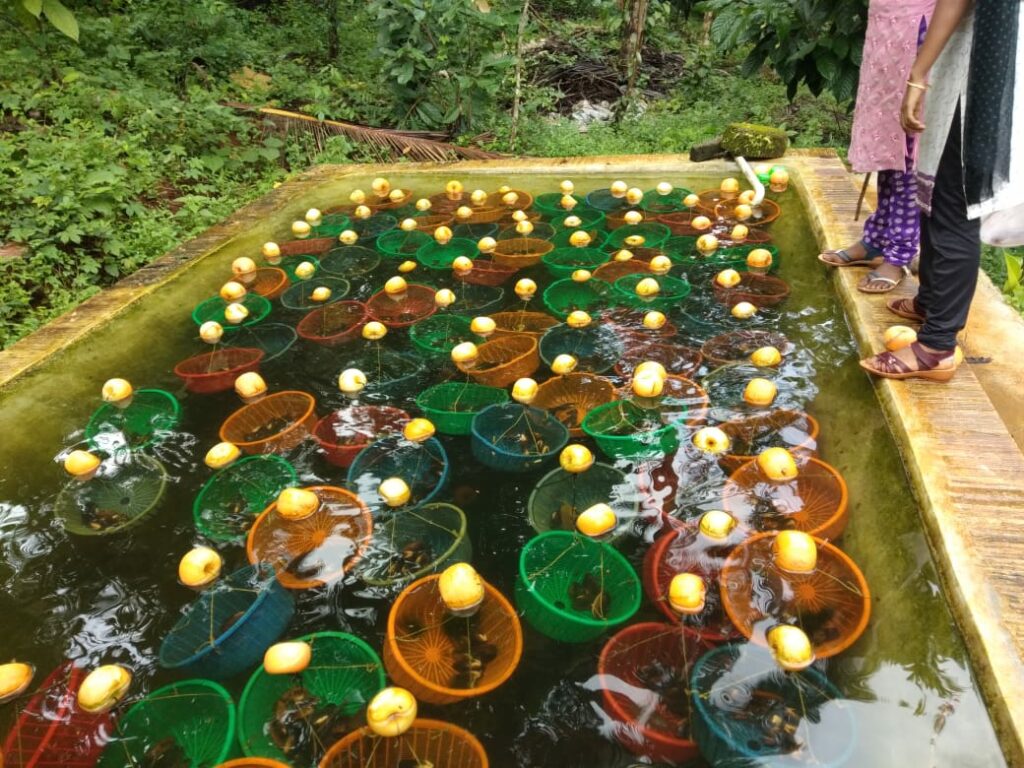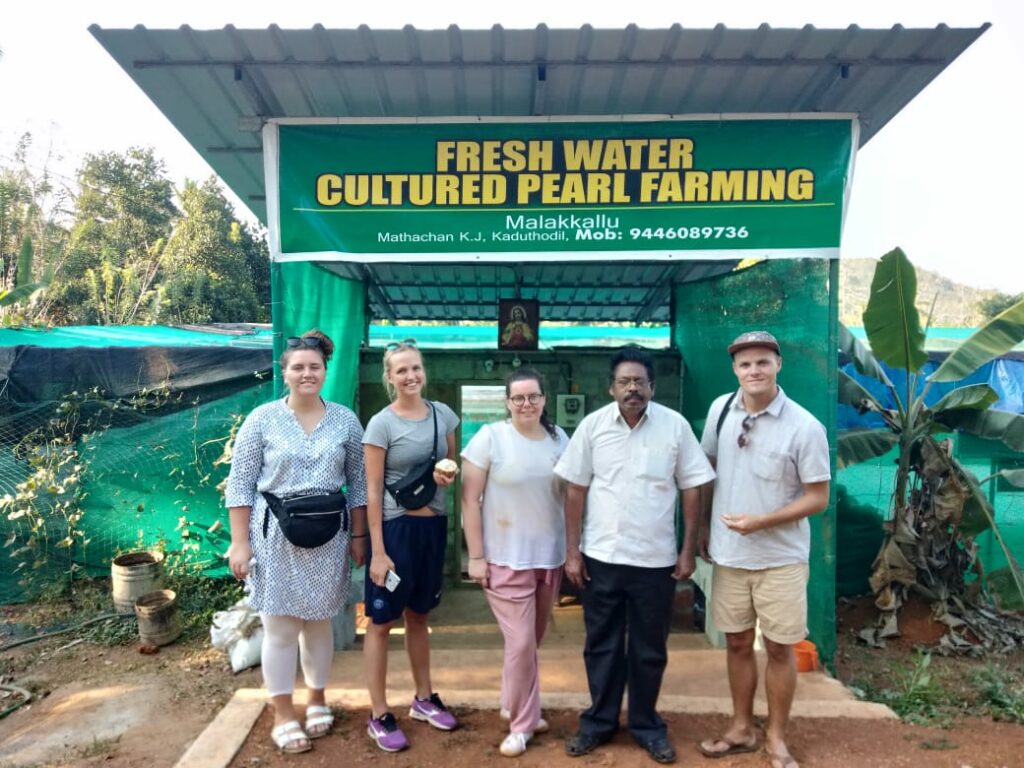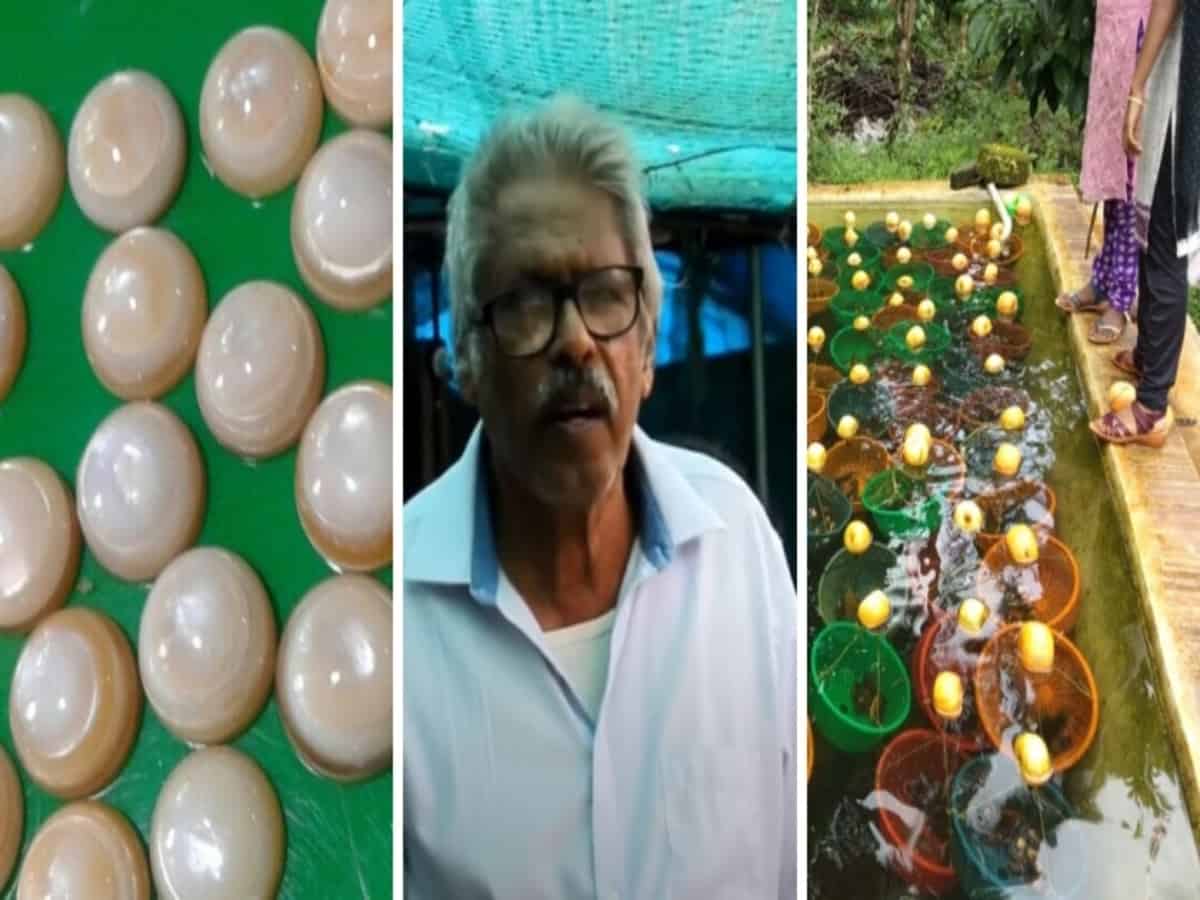By SERENE SARAH ZACHARIAH
If you thought that pearls could only be found in oysters in the ocean, then this farmer from Kasargod, Kerala is here to prove you wrong because he has successfully cultivated pearls in a pond, in his backyard.
Yes, you read that right. For the last two decades, KJ Mathachan, 65, has cultivated pearls using freshwater mussels that are sourced from rivers originating in the Western Ghats. These mussels are treated, and produce upto 50 buckets of pearls annually, earning him upto Rs 4.5 lakh every 18 months. Most of them are exported to Australia, Saudi Arabia, Kuwait and Switzerland.
So how did he do it?
21 years of pearl cultivation

Mathachan was working as a professor in the telecommunications department at the King Fahd University of Petroleum & Minerals in Dhahran, Saudi Arabia, when he received the opportunity to go to China as an Arabic to English translator for the ARAMCO Oil Company.
“During my visit, I went to the Danshui Fisheries Research Center in Wuxi, China. Fisheries was an area that always sparked my interest so I decided to explore the different courses they had and that’s when I came across the pearl cultivation diploma they were offering. This was definitely something very few people had explored in India, so I thought why not give it a go? ” Mathachan explains.
A few weeks later, Mathachan quit his job and moved to China to pursue the diploma. Six months later, he completed the course and returned to Kerala in 1999 to cultivate pearls in his own backyard.
“It was a quick decision and many people criticised it, but I had a strong gut feeling that this kind of business was unique and would definitely work out,” he adds.
Mathachan started collecting freshwater river mussels that were brought from Maharashtra or sourced from the rivers originating from the Western Ghats and started treating them in buckets in his backyard.
After the first 18 months of cultivation, Mathachan had produced 50 buckets of pearls!
“I had invested around Rs 1.5 lakh as an initial investment and in just a year’s time, I had produced pearls that were worth upto 4.5 lakh, giving me 3 lakh in profit,” Mathachan explains.
Ever since then, Mathachan’s pearl business has been flourishing and has also received the license to take classes for people who hope to start their own pearl cultivating business.
But if not for oysters, how does one produce pearls in buckets? Mathachan tells us how.
The process

“There are three basic kinds of pearls — artificial, natural and cultured. The cultured pearl is what I’ve been cultivating for more than 21 years now and it is the easiest one to cultivate since freshwater mussels are readily available in India,” explains Mathachan.
The mussels that are collected from rivers are delicately opened and a pearl nucleus is deposited inside of it. The mussel is then entirely immersed in water (at a temperature of 15-25 degree Celsius) in a mesh container with bacteria to feed on. Over the 18 months, the nucleus develops a pearl sac collecting calcium carbonate from the mussel shells. The nucleus forms upto 540 layers of coating over it, hence forming exquisite pearls.
All of the pearls that are harvested in Mathachan’s farm are exported to Australia, Kuwait, Saudi Arabia and Switzerland, where there is a higher demand for cultured pearls.
“Most of the pearls available in the Indian market are artificial — they look ‘original’ because of a synthetic pearl coating. This is why they are cheap here. A real pearl would cost around Rs 360/carat and Rs 1800/gram,” Mathachan explains.
Mathachan has set up an artificial tank in his backyard for bulk production.
Libin Kurian, a YouTuber who has visited Mathachan’s pearl ‘farm’ explains, “The tank is about 30 metres in length, 15 metres in width and 6 metres deep. I’ve never seen a business idea so unique and the effort that has gone into creating the set up is truly remarkable. Besides this Mathachan has also managed to cultivate vanilla, coconuts and local varieties of mangoes in his remaining land.”
Although Mathachan had a severe stroke in 2018, he has been managing the cultivation with the help of a few local farmers. Alongside the cultivation, he has also started taking classes for people who have shown interest in the field of pearl cultivation as well as creating products from mussel shells and pearls.
Online classes during lockdown

While business has been dull for the past few months due the lockdown, Mathachan has managed to move his classes to the online space and has been receiving a lot of attention for his unique business idea.
“When I first heard about cultivating pearls, I found it impossible to believe, but on visiting his farm, I realised how feasible it was and after attending his classes, I clearly understood the process and was able to start on a small scale basis,” says Asha John, a Kochi based homemaker.
Ardra Sahadeva, a final year BCom student who has been attending Mathachan’s classes shares a similar sentiment.
“Over a span of 28 days, Mathachan sir explains every little detail involved in the process —
from where to source the raw materials to the hygiene measures to be followed during cultivation. Thanks to him, my lockdown has been quite productive,” she explains.
Over the years, Mathachan’s cultivation has gained a lot of popularity and as a result, several students from universities across Kerala and even the fisheries department of Karnataka have visited his pearl farm. He has also given several lectures for the University of Agricultural Sciences, Bengaluru.
“If I had continued with my job in Saudi Arabia, I would be like any other person in my town but I decided to try out something that was unique. Pearl cultivation was an untapped area in India at that time and thankfully I decided to explore it and it is still flourishing,” he concludes.
If you wish to get in touch with KJ Mathachan, you can contact him at: +91 94460 89736
Picture Sources: KJ Mathachan
(Edited by Gayatri Mishra)

